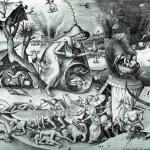
Source: unknown artist /pxhere
The defiled mind, with its attachment to the falsely understood self, establishes an erroneous duality between that self and the rest of being. Reflecting upon that duality, it establishes a false view of the world, seeing it as something entirely independent and separate from the self. Then it creates concept after concept for the various phenomena it observes in being, separating and dividing them from each other. The tendency to dissect being and divide it into independent, non-related atomic parts then requires a view to the world which coordinates them all in a theory that explains them and the whole realm of being. The defiled mind, therefore, is said to characterize the various phenomena which it perceives and imputes essentialities upon them due to such characterizations, creating false views as to the realm of being but also to the self which it essentializes and opposes against them all. With defiled minds, ignorance of reality as it is remains a problem for us, because we deliberate and act according to the false concepts which we impute on the world, concepts which try to separate and divide the world instead of seeing the integral unity which lies behind all being. We must realize the error in this as the first step towards correcting the problem. We must transcend the normal way of viewing reality and see, with the great enlightened saints of old, “the harmonious synthesis of everything ineffably interconnected in the unfolding of a single, harmonious cosmos…”[1]
The problem with discursive reasoning and the conceptual wisdom which flows from it is that it comes out of thoughts and words which impose a dualistic understanding upon being. It divides what is fundamentally united because it is incapable of understanding and realizing distinctions without dualistically dividing up being. Intellectually, analytically, we can be led to see the problems inherent in such dualism; we can come to realize the logic which demonstrates why such dualism will always lead away from the truth, and so we can attain a level of non-dualistic thinking, but in doing so, we will have not attained the undefiled mind with its nonconceptual, higher form of wisdom: we will have attained, as Vasubandhu explains in his commentary on Mahāyānasaṃgraha by his brother, Asaṅga, a form of wisdom which is the foundation by which we begin our search for and hopeful attainment of nonconceptual wisdom and with it, the realization of the truth which transcends such realization:
Here, nonconceptual wisdom is asserted to be superior prajñā. This [nonconceptual wisdom] is of three types: (a) nonconceptual wisdom arising from effort, that is, analytical nonconceptual [wisdom], (b) actual [nonconceptual wisdom], and (c) [the wisdom] attained subsequently to that [nonconceptual wisdom]. In terms of prajñā, (a) [analytical nonconceptual wisdom] is the first superior prajñā. (b) The [nonconceptual] prajñā whose character is internal [personal experience] is the second superior prajñā. (c) The prajñā that is supported [by the second one] is the third superior prajñā. Since [actual] nonconceptual [wisdom] is what is to be accomplished, this very [wisdom] is therefore the result, while analytical [wisdom] serves as its cause. The [nonconceptual wisdom] that represents the result also serves as the cause of subsequently attained [wisdom]. Therefore, once this [nonconceptual wisdom] has been accomplished, both of the [other two] will have been accomplished too.[2]
Striving for an undefiled mind and overturning its defiled way of conceptualizing being requires us to first come to terms with the problem of the mind itself and how and why the way it thinks and interacts with the rest of being in a defiled manner. We can come to know this. We can some to realize the logic of this. We can begin to realize the implications of this and act differently as a result of this realization: but there is a limit to which study and analysis can bring. It is a realization of the truth. It can be said to be a form of nonconceptual wisdom because it is the realization that the truth transcends our dualistic mode of thinking. It allows for approximations of the absolute as representations of the higher, non-dualistic form of the truth as it is in itself, but it remains, paradoxically, a concept and therefore can only stand as the base by which we seek after the realization of that truth itself. It is, Vasubandhu explained, the knowledge someone who has read a treatise might have when they have not fully and properly understood that treatise. They might know the terms and have a general concept of what is to be known, but they do not know it. Understanding that treatise is the equivalent of the realization or experience of nonconceptual wisdom.[3]
Nonetheless, Vasubandhu pointed out that not only is there the realization of nonconceptual wisdom, there is the wisdom which we receive from that experience, which transcends it. In other words, not only do we have the possibility of understanding the truth being non-dual as a result of analysis, and then we come to realize and experience that truth, we then have something which lies beyond it. Realization and experience of the truth transforms us, makes us greater, and as a result, what we experience of that realization will likewise grow and become greater.[4] This is possible because we do not have to become, indeed, should not become attached to the experience itself. We do not merely seek after the experience of heaven for ourselves, but for the union between heaven and earth,[5] so that in the realization of heaven (and the nonconceptual wisdom which we attain) we do not hold ourselves attached in a quietist union with that wisdom apart from action. That would be selfish and an indication we still have mental obscurations which continue to defile us and our thoughts. Rather, we must act upon that wisdom and turn ourselves back to earth and take what we now know and use it to direct and guide others to the truth itself as well as completing our own spiritual transformation, realizing the fruit of that wisdom in ourselves.[6] We are called to experience, understand, and thrive in the truth, and in this way, as we realize our unity with the truth, we will realize our unity with all things, even as we realize all things together with us are comprehended by the truth, never divided from it. In this way, we will finally realize that neither are we the truth itself, nor are we other than the truth: once we have overcome the dualism of conceptual wisdom, this paradox will be made clear.
[1] St. Maximos the Confessor, The Ambigua: Volume I. trans. Nicholas Constas (Cambridge: Harvard University Press, 2014), 211 [Amb. 10.19].
[2] Vasubandhu, “A Commentary on ‘A Compendium of the Mahāyāna’” in A Compendium of the Mahāyāna: Asaṅga’s Mahāyānasaṃgraha and Its Indian and Tibetan Commentaries. Trans. Karl Brunnhölzl (Boulder, CO: Snow Lion, 2018), 363. Prajñā is a term which, often translated as wisdom, indicates direct perception or insight into reality.
[3] See ibid., 370.
[4] This is explained in Mahāyāna Buddhism as the different stages or bhūmi a bodhisattva goes through from the time they experience nonconceptual wisdom until they become a Buddha.
[5] “Thy will be done, on earth as it is in heaven.”
[6] Likewise, as we seek after nonconceptual wisdom, we can have times in which we attain an experience of it, only to come back to our ordinary way of life. The fruit of such a mystical connection with the truth will allow us to purify our conceptual thoughts as we reflect upon our experience and what it means. Thus, even when we have yet to attain a continual realization of nonconceptual wisdom, which is to be had with an undefiled mind, we can find ourselves experiencing it in part, which will motivate and guide us to continue our spiritual transformation, to correct and purify our mind, until at last we have attained the undefiled mind which we seek.
Stay in touch! Like A Little Bit of Nothing on Facebook












